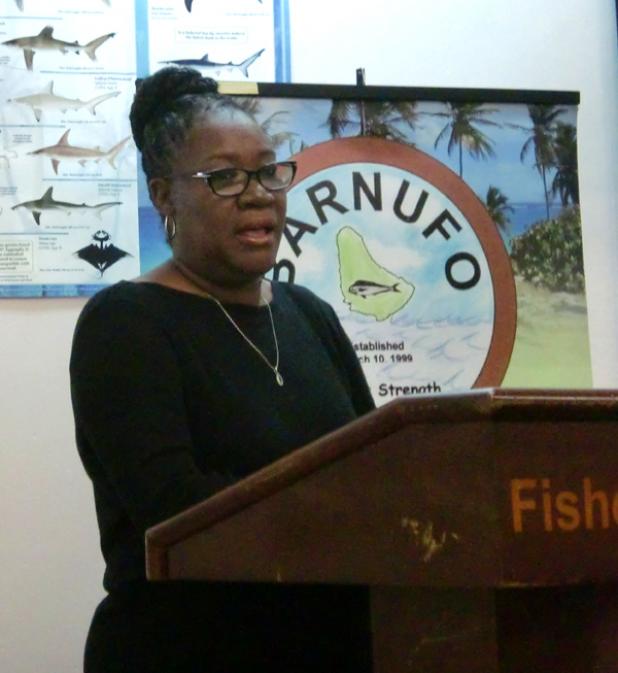
President of the Barbados National Union of Fisherfolk Organization (BARNUFO), Vernel Nicholls.
Shark plan
Fri, 04/15/2016 - 12:00am
MEMBER States of the Food and Agriculture Organization (FAO) of the United Nations are being encouraged to adopt a National Plan of Action for the Conservation and Management of Sharks (NPOA – Sharks).
This is recommended if their vessels carry out directed fisheries for sharks or if their vessels regularly catch sharks in non-directed fisheries, of which both of these are the case in Barbados.
Yesterday, as part of the development of a National Plan for Barbados, the FAO hosted a validation workshop on the island’s shark fishery, bringing together fisherfolk, vendors, divers and government in collaboration with the Barbados National Union of Fisherfolk Organization (BARNUFO), at the Fisheries Division, Princess Alice Highway.
Nikola Simpson, Fisheries Consultant at FAO recalled that the Convention on International Trade in Endangered Species 16th Conference of Parties (CITES CoP16) in 2013 indicated that very few countries in the Caribbean have implemented this internationally agreed plan. She said CITES also established international trade regulations for four species of shark: oceanic white-tip and the smooth, scalloped and great hammered sharks and all species of manta rays, which are found in the wider Caribbean Region.
Simpson went on to explain that NPOA – Sharks for Barbados will be an operational set of guidelines and examples including objectives on how to improve management of the shark fishery, and ensure that it continues to function in the ecological, economic and social roles.
“This Plan will suggest that landings and catch data on sharks be collected and broken down by species where possible. It will also provide ways in which identification of species can be improved such as through the Barbados Sharks and Ray poster which have been distributed island wide specifically at markets and landing sites over the past three months. It will suggest ways in which collaboration amongst stakeholders can be improved…”
Simpson, a Marine Biologist also pointed out that there are limited and inadequate management, infrastructure and legislative framework in the Caribbean to appropriately address the conservation and management of shark species. “The adoption of a proactive and precautionary approach to the development of a comprehensive management plan, should contribute to an industry that is economically viable and environmentally sustainable,” she stated.
President of BARNUFO, Vernel Nicholls pledged her organisation’s support behind the initiative.
“This is also of importance to BARNUFO because as the fisherfolk, research is important to us so that we would have an idea of what is happening in our fisheries; in our waters, therefore it was easy to support the initiative….I was quite amazed with the work that was done and to learn more about the sharks, because for us traditional fisherfolk we concentrate more on the flying fish, dolphin… those fish we usually participate in for our livelihoods. Coming out of this initiative it will be good for us to know more about what is happening with Shark Fishery.”
During the workshop, stakeholders provided their input through a working group session on the main perceived issues regarding the shark fishery and objectives to improve management. (TL)
